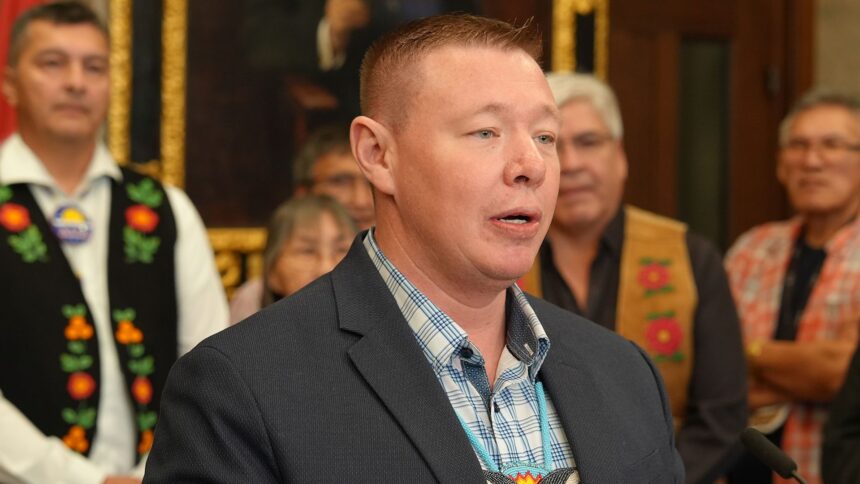Jaime Battiste, the Mi’kmaq MP from Nova Scotia and Parliamentary secretary to the minister of Crown-Indigenous relations says the Liberal government has a mandate to fast-track Bill C-5 — the One Canadian Economy Act — and pass it by July 1. “I, as a member of Parliament for the Liberal government, as well as other Indigenous people in our caucus, we all campaigned on getting something done by July 1st,” Battiste told reporters on Wednesday. “Canadians want us to meet the moment on this, and that’s what we’re expecting to do.” First Nations, Inuit and Métis leaders have denounced the bill, citing a lack of consultation. They’re encouraging Prime Minister Mark Carney to scrap it and start again with Indigenous input. Battiste said he has been personally reaching out to chiefs about the bill. “I’ve been talking with chiefs for at least 10 days on this, asking their thoughts since we introduced it,” he said. At the same time, Battiste acknowledged that communication with Indigenous leaders must improve, especially to clarify that the legislation reaffirms section 35 of the Constitution and is intended to comply with the United Nations Declaration on the Rights of Indigenous Peoples (UNDRIP). “We’re continuing to listen to them now, continuing to hear their concerns, and they’re going to have some time at the committee, and I’ve been in constant touch with not only my chiefs in Nova Scotia but also the [Assembly of First Nations] national chief and trying to figure out how we can better communicate moving forward.” Battiste argued that full consultations can’t happen yet, as there are currently no projects in the queue. “It’s so hard to consult on hypothetical projects that might only impact a few,” he said. “If you’re looking at the duty to consult legally, and I used to teach this, as a professor of Aboriginal Treaty Rights at Cape Breton University, the duty to consult is triggered when there’s a project that could adversely impact Indigenous communities.” Since his election, Carney has held four meetings with premiers and territorial leaders to talk about his plan to fast-track projects and to get their input. The leaders had opportunities to propose potential projects behind closed doors. None of the specifics of what projects might be pushed as “national interest projects.” Under proposed legislation anything deemed a special status project could potentially skip some of the usual approvals. For example, the proposed law gives unprecedented powers to the federal cabinet to sidestep more than a dozen Canadian laws, including the Fisheries Act, Migratory Birds Convention Act and Canadian Environment Protection Act, in an effort to fast-track projects of “national interest.” According to the prime minister, the goal is to cut the time needed for the decision-making process from five years to two. The bill will also allow Ottawa to make its decisions behind closed doors and without debate in Parliament or the public. The legislation outlines non-binding criteria such as whether a project advances Indigenous interests or contributes to clean growth and Canada’s climate goals. The Assembly of First Nations, Inuit Tapiriit Kanatami, and the Manitoba Métis Federation told the Senate Committee of the Whole on June 16 that the bill was mishandled, noting it was only shared with “Indigenous partners” on June 6, just ten days before the final debate. Their leaders called the Crown’s approach a breach of its Constitutional, treaty, and UNDRIP obligations. They said the protection in the bill for Indigenous rights is too weak. Chiefs in Ontario also held a protest against the proposed legislation on Parliament Hill on Tuesday. Battiste, however, believes the safeguards are already in place. “I’m reading the legislation as most folks are and saying that this is what’s in the legislation,” he said. “What’s clear in the legislation is that in order for you to move forward on these legislative pieces that you actually have to not only advance Indigenous interests but also look at our climate targets on that. “And I think those are some of the main concerns that I’ve heard from my Indigenous stakeholders.” Battiste said he has encouraged ministers to do more proactive outreach. “I know that the chiefs tend to be busy with what’s going on in their communities. That’s why I’ve asked ministers to proactively reach out to their local leaders and say, ‘Here’s what’s in the legislation. What are your concerns about the actual legislation?’” Battiste added that the government still has time to do the necessary engagement work. “I think this is turbulence on a flight that once we land the plane, we’re going to be able to have the conversations,” he said. “I’m confident that we’re going to do the work over the summer to engage and to talk about how do we move forward on this while still ensuring that we meet what the prime minister has said, is having this done by July 1st.” Bill C-5 is expected to pass on Friday. Continue Reading
Mikmaq MP defends governments One Canadian Economy Act

Leave a Comment










